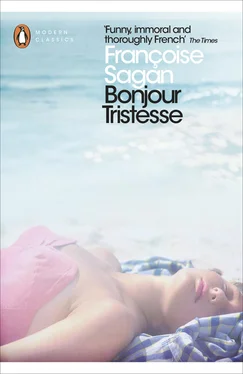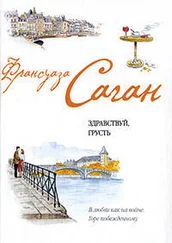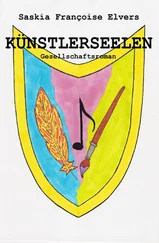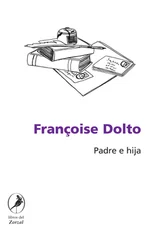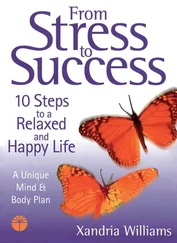‘Luc, I can’t go on like this. You mustn’t leave me. I can’t live without you. You’ve got to stay. I’m alone, I’m so alone. It’s unbearable.’
I listened in surprise to my own voice. It was a young, frank, beseeching voice. I was telling myself the very things that Luc might have said: ‘Come on now, you’ll get over it, calm down.’ But I went on talking and Luc went on being silent.
Eventually, as if to staunch that flow of words, he took my head in his hands and kissed me gently on the mouth.
‘My poor darling,’ he kept saying, ‘my poor sweetheart.’
He sounded distraught. I thought: ‘This is it,’ and, simultaneously: ‘I’m greatly to be pitied.’ I began to weep on his jacket. Time was passing, he would soon be taking me back to the residence, exhausted. I would go along with it and afterwards he wouldn’t be there any more. I felt a surge of revolt.
‘No,’ I said, ‘no.’
I clung on to him. I wished I could be him, that I could simply disappear.
‘I’ll phone you. I’ll see you again before I leave,’ he said. ‘Forgive me, Dominique, forgive me. I’ve been very happy with you. You’ll get over it, you know. We get over everything. I would give anything to …’
He gestured helplessly.
‘To love me?’ I said.
‘Yes.’
His cheek was soft, and warm with my tears. I would not be seeing him for a month and he didn’t love me. It was a strange thing, despair. Strange, in that you come through it. He drove me back to the residence. I had stopped crying, I was drained. He rang me the next day and the day after that. On the day of his departure I had flu. He came up for a moment to see me. Alain was there, just calling in, and Luc kissed me on the cheek. He said he would write.
Five
Sometimes I woke in the middle of the night with a dry mouth, and even before I had fully emerged from my slumber, something would whisper to me to go back to sleep again, to plunge back into the warmth and unconsciousness that provided my only respite. But I was already saying to myself: ‘It’s just that I’m thirsty; all I have to do is get up, walk over to the washbasin, have a drink of water and go back to sleep.’ But when I was on my feet and caught sight of myself in the mirror by the dim light coming in from the streetlamp, and when the tepid water trickled down my throat, then despair took hold of me and I went back to bed shivering, with a real impression of physical pain. Once I was lying on my stomach with my head in my arms, I would crush my body against the bed as if my love for Luc had been a warm, mortal animal that I could have crushed just like that, in revolt, between my skin and the sheet. And then battle would commence. My memory and my imagination were two fierce enemies. I remembered Luc’s face and Cannes, what had been and what might have been. And my body, so much in need of sleep, was in an endless state of revolt, as was my intelligence, which was sickened by it all. I would sit up and reckon it all out: ‘I am me, Dominique. I love Luc, who doesn’t love me. My love is unreciprocated, so sadness is inevitable. Break it off!’ What’s more, I imagined ways of breaking it off for good, very nobly sending Luc an elegantly expressed letter explaining that it was over between us. But any such letter only interested me insofar as its elegance and nobility might bring Luc back to me. And no sooner did I see myself parted from him by this cruel means than I was already picturing our reconciliation.
All that I had to do was to shake myself out of it, as good folk say. But for whose sake ought I to shake myself out of it? I was not interested in anyone else, nor even in myself. I was only interested in myself in relation to Luc.
There was Catherine, Alain, the streets, the boy who kissed me at a party and whom I didn’t want to see again. There was rain, the Sorbonne and cafés. There were maps of America. How I hated America! There was boredom. Would all this never end? Luc had been gone for more than a month. He had sent me one sad, tender little note that I knew by heart.
What I found comforting was that my intelligence, which until then had been opposed to my passion, making fun of it and ridiculing me and giving rise within me to painful dialogues, was gradually becoming an ally. I no longer said to myself: ‘Let’s put an end to this nonsense,’ but: ‘How can the damage be limited?’ The nights were invariably dreary, bogged down in sadness, but the days sometimes passed quickly, taken up by reading. I thought about ‘Luc and me’ as if we were a case-study, although that didn’t prevent those unbearable moments when I would stop dead on the pavement with that nameless thing overcoming me and filling me with disgust and anger. I would go into a café, put twenty francs into the jukebox and treat myself to five minutes of dolefulness, thanks to our tune from Cannes. Alain ended up loathing it. But I knew every note, it brought back the scent of the mimosa, I certainly got my money’s worth. I did not like myself.
‘There, there, old thing,’ Alain would say patiently, ‘there, there.’
I didn’t much like people calling me ‘old thing’, but in this instance it was comforting.
‘You’re kind,’ I would say to Alain.
‘Not at all,’ he would say. ‘I’ll be writing my thesis on the subject of passion so it’s purely self-interest.’
But the music convinced me. It convinced me that I needed Luc. I knew very well that my need was both connected to, and separate from, my love. I could still distinguish in him, on the one hand, the human being, the person I had been complicit with, and, on the other hand, the object of my passion, the enemy. And that was definitely the worst part, being unable to take less account of him, in the way you can generally take less account of people who respond to you with half-heartedness. There were also times when I said to myself: ‘Poor Luc, what a strain and nuisance I would be to him!’ And I despised myself for not having been able to keep things light, all the more so because that would perhaps have bound him to me out of wounded pride. But I knew very well that the idea of wounded pride would have been alien to him. He wasn’t an adversary, he was Luc. There was no getting round it for me.
One day when I was coming down from my room at two o’clock to go to class, the landlady held out the telephone to me. My heart no longer beat furiously when I took it, because Luc was away. I immediately recognized the low, hesitant voice of Françoise.
‘Dominique?’
‘Yes,’ I said.
On the staircase all was still.
‘Dominique, I should have phoned you sooner. Do you want to come and see me all the same?’
‘Of course,’ I said. I was keeping my voice so much under control that I must have sounded quite urbane.
‘Would you like to come this evening at six?’
‘That’s fine.’
And she hung up.
I was both upset and pleased to have heard her voice. It brought back memories of that weekend, the car, lunches in restaurants, all the previous settings.
Six
I didn’t go to my class. Instead I walked about the streets wondering what she could have to say to me. Mine was the classic reaction: I felt I had suffered too much for anyone to hold anything against me. When six o’clock came, it was raining a little. The streets were damp and glistening beneath the streetlights, like the backs of seals. Going into the lobby of the apartment block, I caught sight of myself in a mirror. I had shed a lot of weight, hoping vaguely that I would fall seriously ill and that Luc would come and sob at my deathbed. My hair was wet and I had a hunted look. I would inspire in Françoise her perennial kindness. I remained looking at myself for a moment. Perhaps I would have been able able to manipulate the situation, get really close to Françoise, prevaricate with Luc and evade the issue. But for what? How could the issue be evaded when my feelings were as they were, for once absolute, unconditional and wholehearted. I had been truly astonished and impressed by the strength of my love, but I had forgotten that it represented nothing, except, as far as I was concerned, an occasion to suffer.
Читать дальше
